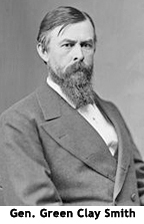|
Kentucky’s Civil War leaders …
Green Clay Smith had rich heritage,
spent his life in state, national fast lane
(EDITOR’S NOTE: This is the 34th in a series about Kentucky’s officers and battle leaders during the Civil War.)
Union Major Gen. Green Clay Smith, a blue-blood soldier and politician, spent his 68 years in America’s fast lane.
 A nephew of famed Kentucky abolitionist Cassius Clay, Smith was a U.S. representative, territorial governor of Montana, a Baptist minister and a nominee for the U.S. presidency in addition to serving as a Civil War commander. A nephew of famed Kentucky abolitionist Cassius Clay, Smith was a U.S. representative, territorial governor of Montana, a Baptist minister and a nominee for the U.S. presidency in addition to serving as a Civil War commander.
Elected to the Kentucky state house before the Civil War, Smith was commissioned as a Union officer when he volunteered, advancing to the rank of major general before he resigned the next year to go to Congress. He was elected to the U.S. Congress from Kentucky in 1862, serving until 1866. That year, Smith was appointed as the Territorial Governor of Montana, serving from 1866-69. He returned to Washington, D.C., where he was ordained as a Baptist minister and became active in the temperance movement.
Smith was born in 1826 in Richmond to John Speed Smith and his wife Elizabeth Lewis (Clay) Smith, the third of seven children. He was named for his maternal grandfather, Green Clay, a wealthy planter and prominent politician. His siblings included Sally Ann Lewis, Curran Cassius, Pauline Green, Junius Brutus, Mary Spencer and John Speed Jr.
Smith’s father was elected to the Kentucky legislature and the U.S. House of Representatives. His mother’s younger brothers, Brutus J. Clay and Cassius M. Clay, both later were elected to the U.S. Congress from Kentucky during the Civil War.
As a young man, Green Clay Smith pursued his academic studies. When the U.S.-Mexican War began, he enlisted in the Army and was commissioned as a second lieutenant in the First Regiment of the Kentucky Volunteer Infantry in 1846.
Smith then returned to Kentucky and was graduated from Transylvania University in 1849, studied law and was admitted to the bar in 1852 and began his practice in Covington. From 1853-57, Smith served as a school commissioner.
Smith then was elected a member of the Kentucky House of Representatives, serving from 1861-63. On April 4, 1862, he was commissioned colonel of the Fourth Regiment of the Kentucky Volunteer Cavalry. He was wounded at Lebanon, Tenn., and advanced to brigadier general of volunteers on July 2, 1862. Later that year, he was elected to the thirty-eighth congress and resigned from his military post on December 1, 1863. He served as chairman of the Committee on Militia from 1865-66 and was brevetted major general of volunteers on March 13, 1865.
The Madison County native resigned from Congress in July 1866 when President Andrew Johnson appointed him as Territorial Governor of Montana. He served there from 1866-69, working to moderate hostilities between European American settlers and the Native Americans who occupied the lands, including tribes of the Blackfoot Confederacy.
After resigning as governor, Smith returned to Washington City and was ordained to the Baptist ministry. He served a number of congregations while supporting the temperance movement. He was pastor in Richmond, Mt. Sterling, Frankfort and Louisville. In 1890, he was called as pastor of the Metropolitan Baptist Church (now Capitol Hill Baptist Church) in Washington, which he served until his death in 1895.
In 1876, the National Prohibition Party nominated Smith for President of the United States. With his running mate, Gideon T. Stewart, the two received 9,737 popular votes in the election. Smith continued his work in religion and temperance.
He died in June 1895 and was interred at Arlington National Cemetery.
|

